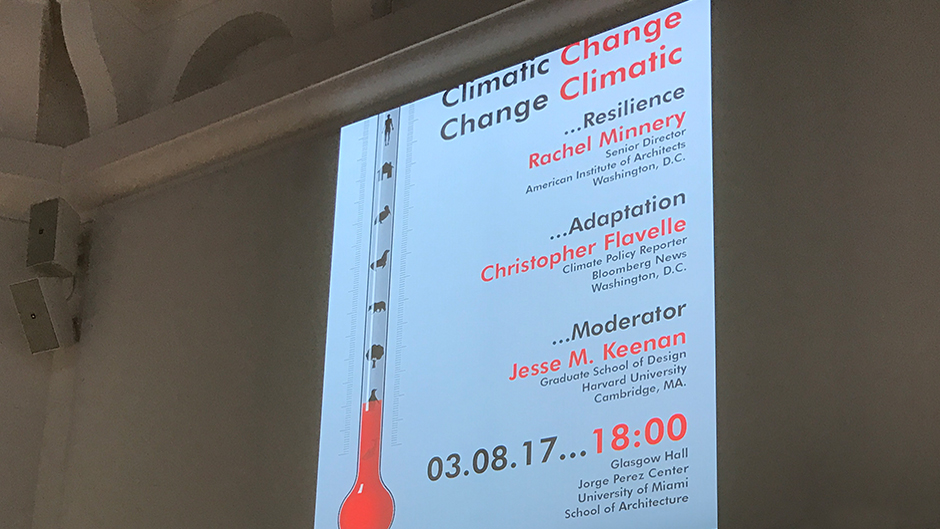Dr. Jesse M. Keenan, faculty at the Graduate School of Design at Harvard University who coordinated the discussion, framed the multi-dimensional considerations of resilience and climate adaptation.
Rachel Minnery, FAIA, the director of built environment policy at the American Institute of Architects in Washington, D.C., and Christopher Flavelle, the policy reporter for Bloomberg News, also shared their views. Minnery, FAIA, who oversees the AIA’s programs for codes and standards, disaster, resilience and community development, discussed the limited legislation landscape and the need for land planning, intervention and the capacity for transformation, along with development of a proactive system to design and build for extremes.
“Only 65 percent of the country is covered by a basic building code,” she said. “More energy into policies that support good practice is needed.”
“What about ethics, do we sell flawed products?” Keenan asked.
Acknowledging recent litigation in this area, Minnery said it is only a matter of time before standards for building codes come into question and the demand for greater transparency of the vulnerability and risks grows. An overarching takeaway from the discussion was clear: resilience remains a “squishy topic,” a nuance with no definitive answer regarding what makes a home resilient. Is it more about standardized building codes or designs that protect homes and people? What is a resilient design? “If you can see water,” Minnery said, “you are not resilient.”
Keenan raised the issue of risks taken by architects and builders, questioning the added value of a building code-driven process. He noted there was a disproportionate burden on building codes, without consideration of land use. The value-add, Minnery said, would be a longer building service, but with all of us working together and taking action.
Flavelle, the Bloomberg News reporter, discussed the reasons for the failure of climate adaptation, mentioning the challenges of the “buy-outs” New Jersey undertook after Hurricane Sandy.
“The idea that people have to leave their homes is the hardest part of the broad climate debate. Bayfront, New Jersey, is an example of a buy-out done right,” he said. “Presently,” he added, “it remains unclear whether the Trump administration will think the issue of climate adaptation is real, and states need to push for help and force the administration to react, with lessons to be learned from New Jersey, Louisiana, Alaska, California, and Florida.” Flavelle agreed that the framework for resilience requires many things: education, component innovation and support, advocacy, practice and research, policy-focused resources and partnerships. “To better adapt to climate change means different things, and they’re all hard: tougher building codes, more built and natural protection, elevating structures and roads and restricting development in the most vulnerable areas”—which is no easy task and impacts builders’ and developers’ economics and profitability.
South Miami Mayor Phil Stoddard, who attended the discussion, said he was pushing for higher elevation-builds (despite the inherent challenges this, too, represents) but he noted that, until flooding becomes a regular occurrence, people won’t focus on the problem. He pointed to some success stories, like the Amazonian basin, where extreme risk due to climate change and sea-level rise are a daily issue. Communities there have successfully implemented adaptive systems to elevate homes during rising water levels, lowering them when the flooding has passed. It can be done. The panelists agreed that climate change, sea-level rise, and our need to look for adaptive solutions is not going away; it is our collective responsibility to make this a priority now, and not wait for a disaster to hit.
“You are the future, dream big, take action and do it together,” Millery said in closing.
The panel discussion, held at Glasgow Hall, kicked off a two-day federal interagency U.S. Community Resilience Panel, on March 9th and 10th at the University of Miami’s Coral Gables campus.


